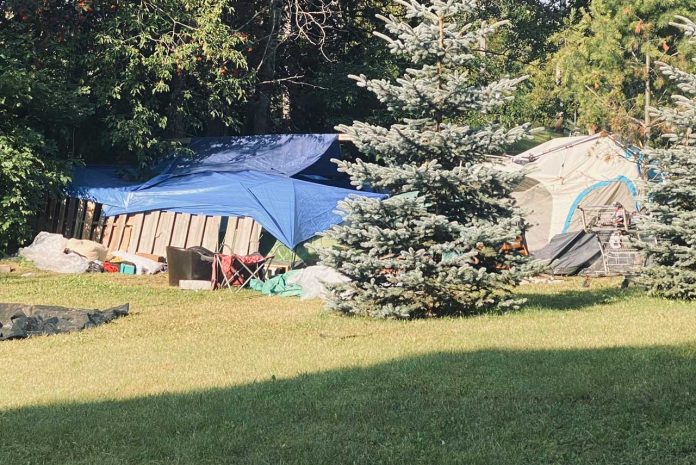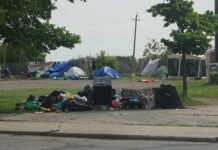By Marcus Powlowski MP
THUNDER BAY – POLITICS – Last weekend I spoke to representatives from the City of Thunder Bay about their proposed temporary housing project which would accommodate about 100 homeless people. There are two sites being considered: one on Miles and Simpson, and the other on the Kaministiquia River just off Syndicate. Given that both sites are in my riding, and the city is looking for financial support from the Federal Government, I feel obliged to weigh in on the issue.
I believe that we need to address the homelessness crisis, and that we need to find solutions to the encampments that have popped up across the city. The city has good reason to propose temporary housing, as our cold Thunder Bay winter approaches. Leaving people to live outside in tents in Northwestern Ontario is both inhumane and dangerous. These are people who need housing solutions. However, I do not agree with the plans to place temporary housing on either of the sites suggested by the city.
Several recent court decisions spell out what cities can and cannot do to address the encampments. Although these decisions were made by lower courts, and may be appealed, they are certainly shaping the actions of cities across the country.
In a recent case from Waterloo, the court found that a municipal by-law that was being used to evict an encampment from public land violated the Canadian Charter of Rights and Freedoms, specifically: the right to life, liberty, and security of the person. The court stressed that the violation was a result of the fact that the city could not provide any other accessible housing alternative for those being evicted, I think most of us intuitively agree with this conclusion. We might, however, reasonably disagree with the municipality’s plans to build where they have proposed, to create a semi-permanent cluster of subsistence level housing in the heart of downtown Fort William.
The city has touted their human rights-based approach, while homeless people have inherent rights, so do other members of our communities. I would suggest that a common flaw in the political discourse about rights from both the political right, and the political left, is that they seem to believe that rights are absolute, and the state has no legitimate ability to limit those rights. Whether we are discussing the rights of gun owners or the rights of drug users, both examples entail a reasonable limitation on what is allowed, based on the premise that we must prioritize the well being of the entire community. For example, some may argue they have a “right” to own semi-automatic weapons. I think most of us would agree that having a lot of semi-automatics around is not in the interest of the majority of people in our society.
The reality is, however, that rights are for the most part not absolute. Rather, they are subject to reasonable limitations. For example, the Canadian Charter of Rights and Freedoms states that the rights and freedoms recognized in the Charter are “subject only to such reasonable limits prescribed by law as can be demonstrably justified in a free and democratic society.”
What are these “reasonable limits”? I would suggest that at the heart of the limitations that courts recognize as legitimate is the notion that governments may legitimately limit one person’s rights in order to protect other people’s interests or rights. With that in mind, let us consider the encampments in our city.
In recent years we have witnessed a deterioration of the downtown cores of many cities across North America, in part because of the significant growth of homeless populations. This is a population that often suffers from some combination of mental illness, addictions, and brain injury (including as a result of overdose). We need to do what we can to help our homeless population: remembering that every person was or is somebody’s child. We absolutely need to remember that homeless people have rights, and we need to protect the rights of these groups. However, governments must also protect the rights of other people in our downtown cores, the elderly, children, and even the able bodied who shouldn’t need to worry for their safety or witness people overdosing on our streets.
In making decisions such as where to temporarily house the homeless population, we ought to consider the interests of those living in the neighbourhood where they are to be resettled. Furthermore, although property rights are not protected by our constitution, I would say it is patently unfair for the government to ask the owners of businesses and homes in the downtown south core to bear the costs of the homelessness crisis.
Although the city is justified in trying to find accessible temporary housing for the homeless, and I would say we are morally obligated to do so, I would suggest that such temporary housing should not be placed in close proximity to existing businesses or residential housing, as would be the case if we were to accept one of the two sites proposed. Placing this housing in a working-class neighbourhood that we are working hard to improve would cause very real harm to that community.
I also recognize the need for accessibility of services, as the courts have also held, and the preference of the homeless to be near the city core. I believe that we can adequately provide services to areas outside the downtown core, and I do not think that the inconvenience to the homeless population of needing to be transported to and from their transitional housing (presumably this would be free) supersedes the very real concerns of homeowners and businesses in old downtown Fort William. There is plenty of unused land that could be used as a potential site for this housing, for example in the inter-city area, that is close enough to provide access to services for the population.
I believe that more comprehensive solutions exist that would better suit the needs of everyone involved, including the community of downtown Fort William and the homeless population of our city. I also have an obligation to represent the needs and interests of constituents in my riding, therefore, I cannot support the current proposal.
Sincerely,
Dr. Marcus Powlowski, MP Thunder Bay -Rainy River





